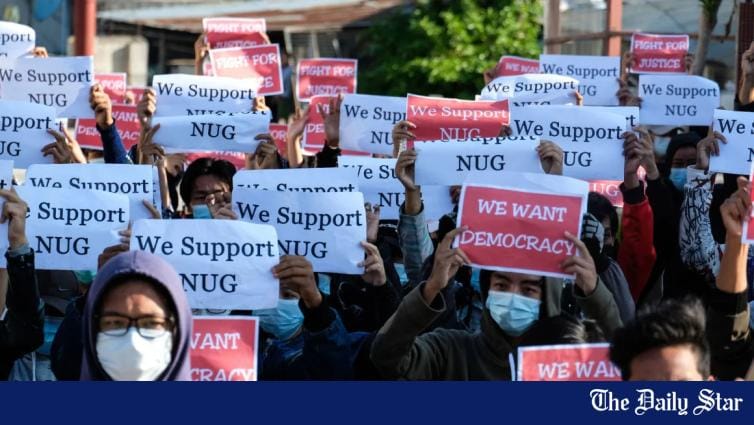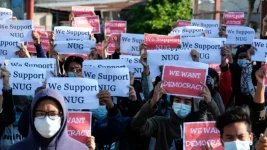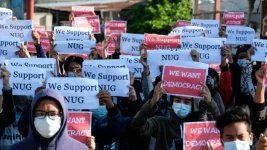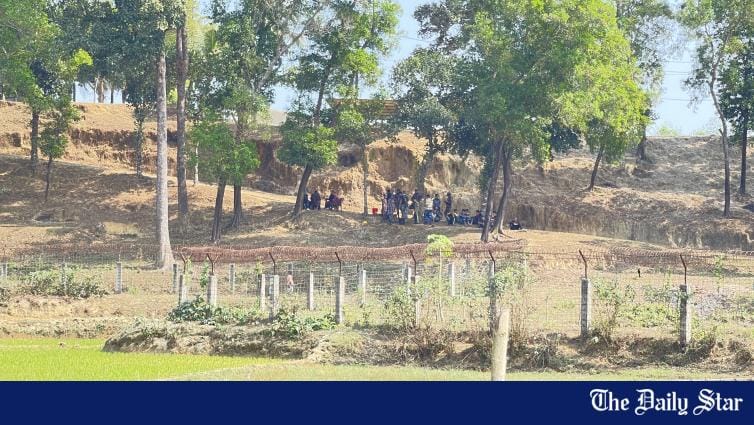Saif
Senior Member
- Joined
- Jan 24, 2024
- Messages
- 16,808
- Likes
- 8,152
- Nation

- Residence

- Axis Group


How are guerillas in Myanmar raising their funds?
Since Myanmar's guerrilla groups are not listed as “terrorist” organisations in Europe and the US, supporters are facing no problems in raising public funds
How are guerillas in Myanmar raising their funds?
Before the launch of Operation 1027 in October last year, the NUG managed to collect taxes from around 38 townships. However, since then, the number of townships from which NUG collects taxes has risen close to 50. FILE PHOTO: AFP
While the Tatmadaw in Myanmar is waging war using state funds, one may wonder: from where is the opposition, the guerillas, getting so many resources? What's the origin of their funds? The surprising fact is that, in their efforts to raise money, the guerillas have successfully established their very own bank—an extremely rare feat in the history of guerilla warfare.
How the 'guerilla bank' started its journey
Guerillas have different names in different regions of Myanmar. In the seven marginal provinces, the guerilla groups comprising non-Bamar tribes mainly raise funds through local businesses and contributions. These businesses involve everything, from timber to narcotics. The groups are quite experienced in this regard.
The situation in central Myanmar, however, is different. There, the Bamar youths, who went to war against the Tatmadaw to restore democracy, are novices in terms of both warfare and fundraising. These guerrillas, collectively known as the People's Defence Force (PDF), have no bordering countries to conduct business with.
In the beginning, PDF's funds came from foreign supporters, and it was tough to bring the money home due to strict government monitoring. Many of these supporters refrained from making financial contributions, fearing that the government would uncover their identities. To avoid these problems and streamline transactions, the Bamar guerillas opened their very own bank.
In 2021-22, many citizens across the country left their government jobs to oppose the military coup. Accordingly, one of the objectives of the Bamar guerillas' bank was to bring these people under the guerilla administration's umbrella by paying them regular salaries and allowances for the cause.
Through such initiatives, the guerrillas are constantly trying to stay one step ahead of the junta in terms of technology.
In the beginning, PDF's funds came from foreign supporters, and it was tough to bring the money home due to strict government monitoring. Many of these supporters refrained from making financial contributions, fearing that the government would uncover their identities. To avoid these problems and streamline transactions, the Bamar guerillas opened their very own bank.
In 2021-22, many citizens across the country left their government jobs to oppose the military coup. Accordingly, one of the objectives of the Bamar guerillas' bank was to bring these people under the guerilla administration's umbrella by paying them regular salaries and allowances for the cause.
Through such initiatives, the guerrillas are constantly trying to stay one step ahead of the junta in terms of technology.
Guerilla bank working through 'guerilla technology'
Many may remember that elected representatives against the military coup named their movement the "Spring Revolution" in February 2021. That very movement has slowly transformed into guerilla warfare. Since the bank was created to finance the war, the National Unity Government (NUG) of Myanmar named it Spring Development Bank (SDB). Launched in July last year, around 1,000 individuals opened accounts with the bank on its very first day. That number now stands at one lakh. Akin to the PDF, the SDB operates in a guerilla-like fashion. Run using technology related to blockchain and cryptocurrency, this is a fully fledged digital bank. And this is why the junta is facing difficulties blocking guerilla financing.
Although SDB's primary goal is to finance the war of resistance, its second goal is to block finances to the military government.
— Altaf Parvez
A group of guerillas with expertise in this field have been assigned to further develop the banking system, and supporting it is Tin Tun Naing, planning minister of the anti-junta government-in-exile. At the time of establishment, SDB also took permission from the exiled government's "central bank." Through this move, the guerillas wanted to show that they were under the umbrella of a formal government, so the customers wouldn't have to worry about being defrauded.
Although SDB's primary goal is to finance the war of resistance, its second goal is to block finances to the military government. This is being accomplished by obstructing the junta's tax collection system, influencing public opinion against the junta's financial products, and by trying to isolate it from the international currency exchange system.
Through these efforts, Myanmar's state assets have been frozen in many countries.
While the bank is primarily based on cryptocurrencies, account holders can also transact in at least 10 currencies, from the US dollar to the Thai baht, and funds can be transferred internationally as well.
SDB, facilitated by currency swaps in the beginning, said in 2023 that it would connect to the international SWIFT system of financial transactions this year, and even obtain its own debit card. The government-in-exile is able to trade assets of the country through this bank alone. A "customer" can open up an account with the bank by disclosing very basic information, and SDB has over 100 "relationship managers" across the world.
Last year, the NUG raised over $100 million, a large part of which was raised from the "bazaar" through SDB issuing treasury bonds. In November, the bank sold 10 percent of its stake and earned $10 million in just 10 days. The guerilla warfare in Myanmar has reached its current heights due to these very funds.
Whose assets is NUG trading, and how?
Many are surprised to know that Myanmar's government-in-exile is trading the country's assets despite having no offices in the capital or in the country's other major cities. The NUG came up with this idea when it began its official fundraising programme. This involved virtual selling of the real estate of leading military generals, including the head of the junta, Min Aung Hlaing. NUG officials, who have acquired the necessary documents, have given buyers the assurance that if the Spring Revolution succeeds, it will hand the properties over to them. The programme was implemented with great enthusiasm and many properties were thus sold. In the process, the guerilla administration earned $150 million.
An incentive for such a programme is that those who are buying these properties are supporting the guerrilla warfare for their own gains. Some mineral resources have already been sold in advance within the framework. But the guerrilla economy is not entirely virtual.
According to various sources, before the launch of Operation 1027 in October last year, the NUG managed to collect taxes from around 38 townships. However, since then, the number of townships from which NUG collects taxes has risen close to 50, according to sources, because of their operational successes.
There have been cases of alleged coercion taking place because of such measures. However, the NUG's financial capacity is still quite weak compared to that of the junta. It can now spend up to $5 million a month on the guerrillas for warfare purposes, but the junta's budget is many times larger. However, for the junta, the financial backing that the guerrillas are getting is a permanent challenge.
The NUG once called for a boycott of about 111 products and organisations of various companies run by the generals, which weakened the junta's financial strength. On December 12, news agency AP published the results of a survey and stated that various cloth manufacturing companies in Myanmar were producing only 60 percent of their capacity.
Meanwhile, the exchange rate reached about 2,100 kyats per US dollar, which was 1,300 kyats before the military coup.
The fall of the kyat's value and the dwindling income of state institutions, as well as the rising value of cryptocurrencies, is good news for the PDF guerrillas, as SDB is enjoying double the benefits.
Recently, as the Tatmadaw's grip on the bordering areas with Bangladesh, India, and Thailand is loosening, the junta's income from inter-country trade has gone down, and continues to go down. Meanwhile, the guerilla groups' income is rising through various types of legal and illegal businesses in these areas. Although the bulk of this money will go to non-Bamar guerrillas, the Bamar-PDF has friendly relations with them. The declining junta control over border trade is also good news for the NUG.
An incentive for such a programme is that those who are buying these properties are supporting the guerrilla warfare for their own gains. Some mineral resources have already been sold in advance within the framework. But the guerrilla economy is not entirely virtual.
According to various sources, before the launch of Operation 1027 in October last year, the NUG managed to collect taxes from around 38 townships. However, since then, the number of townships from which NUG collects taxes has risen close to 50, according to sources, because of their operational successes.
There have been cases of alleged coercion taking place because of such measures. However, the NUG's financial capacity is still quite weak compared to that of the junta. It can now spend up to $5 million a month on the guerrillas for warfare purposes, but the junta's budget is many times larger. However, for the junta, the financial backing that the guerrillas are getting is a permanent challenge.
The NUG once called for a boycott of about 111 products and organisations of various companies run by the generals, which weakened the junta's financial strength. On December 12, news agency AP published the results of a survey and stated that various cloth manufacturing companies in Myanmar were producing only 60 percent of their capacity.
Meanwhile, the exchange rate reached about 2,100 kyats per US dollar, which was 1,300 kyats before the military coup.
The fall of the kyat's value and the dwindling income of state institutions, as well as the rising value of cryptocurrencies, is good news for the PDF guerrillas, as SDB is enjoying double the benefits.
Recently, as the Tatmadaw's grip on the bordering areas with Bangladesh, India, and Thailand is loosening, the junta's income from inter-country trade has gone down, and continues to go down. Meanwhile, the guerilla groups' income is rising through various types of legal and illegal businesses in these areas. Although the bulk of this money will go to non-Bamar guerrillas, the Bamar-PDF has friendly relations with them. The declining junta control over border trade is also good news for the NUG.
The many faces of contributions
Many may know that lotteries are very popular in Myanmar, and the government itself used to conduct lotteries. Banking on this, since the beginning of the guerilla war, the NUG has also been raising funds by issuing various types of lottery tickets. It is through this initiative, and the need to make lottery payments, that the idea of the digital bank occurred to NUG organisers. Although funds raised from lotteries may not be much, they still help finance the cause and, at the same time, hurt the junta's fundraising efforts. While Naypyidaw rulers are still outmatching the guerillas in terms of ammunition, the latter's ingenuity is chipping away at the junta's armour.
Many local artists are also donating money to the NUG by selling their artworks at open auctions through social media. In addition, in different countries of the world—especially Thailand, Singapore, Australia, and Japan—Myanmar expatriates are organising musical events and selling T-shirts and various cultural products to raise funds. To help in whatever way possible, many even sell homemade noodles at these events. Youngsters, meanwhile, are selling Myanmar-related mobile games to send money back home.
Since Myanmar's guerrilla groups are not listed as "terrorist" organisations in Europe and the US, supporters are facing no problems in raising public funds. The money is not only being used to buy ammunition from the illegal market, but also to run hospitals and educational institutions in the free zones, and even to entice government soldiers to switch sides. Besides the Bamars, the Karens, Kachins, and Rakhines are also raising a lot of money this way. All this is being done to help the guerillas, even if a tiny amount, and fight for the cause.
Translated from Bangla by Shoaib Ahmed Sayam.
Altaf Parvez is a researcher of history and has authored 'Burma: Jatigoto Shonghater Shaat Doshok.'





